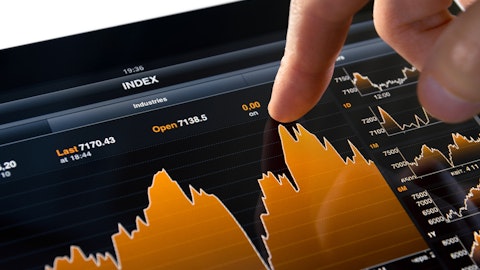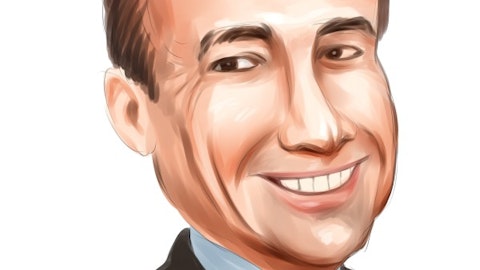Unlike Most Investors, Boaz Weinstein’s Fund on the Rise Amid Coronavirus (JewishInsider.com)
As the stock market plunges amid concerns about the coronavirus and its impact on the global economy, one hedge fund appears to be on the rise – Saba Capital Management, headed by Boaz Weinstein, which made significant gains in recent weeks, according to a letter sent to Saba clients over the weekend. Money talks: Weinstein told clients that Saba, which manages $2.2 billion, had seen its “most profitable week in the firm’s 11-year history and our most profitable year to date.” Through Friday, Saba’s main fund was up 67% and its tail fund was up 175%, while his closed-end funds ETF was down 17%. The hedge fund manager, who launched Saba in 2009, told investors: “I have had the conviction… for a long time that investors needed to be ready for an extreme market decline.”
Brevan Howard’s Listed Hedge Fund BH Global Up 9.7% This Month To March 13 (Reuters)
HEDGE FUND MANAGER BREVAN HOWARD’S LISTED HEDGE FUND BH GLOBAL UP 9.7% THIS MONTH TO MARCH 13, 12.8% YTD – FILING Source text for Eikon: Further company coverage: [ ] (Reporting by Maiya Keidan)
SEC Stops Allegedly Fraudulent Hedge Fund Offering that Raised $39 Million (AI-CIO.com)
The SEC has charged Florida-based investment adviser Kinetic Investment Group, and its manager Michael Scott Williams, in connection with an allegedly fraudulent unregistered securities offering that raised approximately $39 million from at least 30 investors to invest in a purported hedge fund. The regulator also obtained an asset freeze and other emergency relief against the company and Williams. According to the SEC’s complaint, since at least 2013, Williams and Kinetic fraudulently raised the $39 million by making material misrepresentations to investors whom they solicited to invest in a purported hedge fund called Kinetic Funds I LLC.

Luis Louro / shutterstock.com
SoftBank’s Debt Outlook Turns Negative (Tech Crunch)
Japanese telecom conglomerate SoftBank Group has faced a litany of bad news in recent weeks, including reported revelations from the Wall Street Journal that the head of its Vision Fund was using corporate espionage firms to sabotage his corporate peers and that activist hedge fund investor Elliott Management had invested in the company to try to force more transparency to its balance sheet and board of directors in a bid to drive its stock price higher. The bad news just keeps coming though. Today, S&P Global Ratings downgraded the group’s debt outlook to “Negative” from “Stable” while affirming the debt’s rating of BB+, which is generally considered somewhat speculative or non-investment grade.
British Hedge Fund Lansdowne Racks up Multiple Losses Across Funds – Data (Reuters)
LONDON (Reuters) – Lansdowne Partners, one of Britain’s best-known hedge fund firms, lost money on several of its strategies between the start of the year and early March amid the coronavirus market slump, according to data compiled by HSBC. Lansdowne’s $3.9 billion (£3.2 billion) Developed Markets Fund lost 1.3% in the month to March 6 and 12.1% for the year-to-date, according to HSBC’s data, which was seen by Reuters.
No Indication of Market Bottom (Hedge Nordic)
Stockholm (HedgeNordic) – Brummer Multi-Strategy, the fund of funds investing in the single-strategy hedge funds under the umbrella of Brummer & Partners, is down 3.0 percent year-to-date after losing 3.5 percent this month. Global equity indices, meanwhile, are down in the range of 20 to 30 percent, “with no indication that the bottom is reached,” according to Brummer Multi-Strategy’s portfolio managers, Patrik Brummer and Mikael Spångberg. “Since the market peak in February, we have witnessed massive stock market sell-offs and reversals of risky assets,” Brummer and Spångberg write in a commentary to investors. “The level of uncertainty is higher than in a long time.” The portfolio managers of Brummer Multi-Strategy reckon that “financial markets have reacted very strongly and the future will likely be a period characterized by worry and high volatility, given all unanswered questions concerning the real economic effects and the duration of the crisis.”
Eurekahedge Fund Index tops MSCI AC World Index by 6.11 per cent in February (Hedge Week)
The Eurekahedge Hedge Fund Index registered its strongest outperformance relative to underlying markets since February 2009, outperforming the MSCI AC World Index by 6.11 per cent in February. Long volatility and tail risk hedge funds led the performance tables in February and have outshined most other strategies as market volatility level remained elevated during the month. The global hedge fund industry AUM had increased by USD10.3 billion in 2019. Investor redemptions totalling USD127.5 billion have been recorded throughout the year, a level the industry has not seen after the global financial crisis. Going into 2020, net investor outflows of USD1.7 billion and a performance-based decline of USD30.4 billion have been recorded as of February 2020 year-to-date.





